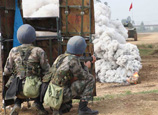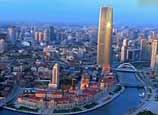
The city is also renowned for its manufacturing. Two-third of the world's iPads are made in Chengdu, and the city's production capacity of computers reaches one-fifth of the world's total.
The Chengdu Investment Presentation and Project Signing Ceremony, which was held in Beijing, Shanghai and Shenzhen this month, was the occasion for pledges to invest 42.253 billion yuan ($6.79 billion) into the city.
Speaking at the ceremony, Mayor Ge Honglin said Chengdu is poised to become the engine of the development of the country's western region, especially as domestic and foreign companies spend more in the city.
With such fast growth, Chengdu is almost certain to continue attracting foreigners, more and more of whom are taking to running businesses and restaurants.
To better accommodate expatriates, the Chengdu government has built up several international communities. The biggest one is in its high-tech development zone, where it has apartments, schools, hospitals, shopping malls and a community church to accommodate 5,000 people.
"Chengdu, with its comfortable living conditions, is ready to welcome more expatriates," said Tang Jiqiang, spokesman for the Chengdu Hi-Tech Development Zone.
"As I stay in Chengdu longer and longer, I feel more and more comfortable," Barnett said. "Like a nice pair of shoes, you never want to take them off."
Matuszak said he sees many of the same advantages.
"Right now, living here is not a problem," he said. "Many of my friends think Yunnan province is the best place to travel. But for living, they come here."
 |














 1.8 million students have taken NEEP. What motivate them to continue study rather than work?
1.8 million students have taken NEEP. What motivate them to continue study rather than work?


![]()
